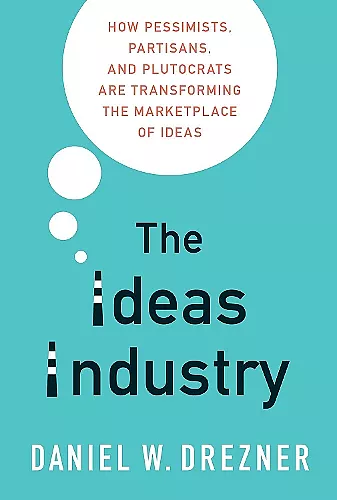The Ideas Industry
How Pessimists, Partisans, and Plutocrats are Transforming the Marketplace of Ideas
Format:Paperback
Publisher:Oxford University Press Inc
Published:14th Feb '19
Currently unavailable, and unfortunately no date known when it will be back
This paperback is available in another edition too:
- Hardback£23.49(9780190264604)

The public intellectual, as a person and ideal, has a long and storied history. Writing in venues like the New Republic and Commentary, such intellectuals were always expected to opine on a broad array of topics, from foreign policy to literature to economics. Yet in recent years a new kind of thinker has supplanted that archetype: the thought leader. Equipped with one big idea, thought leaders focus their energies on TED talks rather than highbrow periodicals. How did this shift happen? In The Ideas Industry, Daniel W. Drezner points to the roles of political polarization, heightened inequality, and eroding trust in authority as ushering in the change. In contrast to public intellectuals, thought leaders gain fame as single-idea merchants. Their ideas are often laudable and highly ambitious: ending global poverty by 2025, for example. But instead of a class composed of university professors and freelance intellectuals debating in highbrow magazines, thought leaders often work through institutions that are closed to the public. They are more immune to criticism--and in this century, the criticism of public intellectuals also counts for less. Three equally important factors that have reshaped the world of ideas have been waning trust in expertise, increasing political polarization and plutocracy. The erosion of trust has lowered the barriers to entry in the marketplace of ideas. Thought leaders don't need doctorates or fellowships to advance their arguments. Polarization is hardly a new phenomenon in the world of ideas, but in contrast to their predecessors, today's intellectuals are more likely to enjoy the support of ideologically friendly private funders and be housed in ideologically-driven think tanks. Increasing inequality as a key driver of this shift: more than ever before, contemporary plutocrats fund intellectuals and idea factories that generate arguments that align with their own. But, while there are certainly some downsides to the contemporary ideas industry, Drezner argues that it is very good at broadcasting ideas widely and reaching large audiences of people hungry for new thinking. Both fair-minded and trenchant, The Ideas Industry will reshape our understanding of contemporary public intellectual life in America and the West.
Drezner is a lively and engaging writer...Throughout the book he is balanced and measured, recognizing that the new era comes with benefits as well as drawbacks. * Nikita Lalwani and Sam Winter-Levy, Times Literary Supplement *
Drezner is a lively and engaging writer...Throughout the book he is balanced and measured, recognizing that the new era comes with benefits as well as drawbacks. * Nikita Lalwani and Sam Winter-Levy, Times Literary Supplement *
ISBN: 9780190906283
Dimensions: 140mm x 208mm x 28mm
Weight: 386g
376 pages